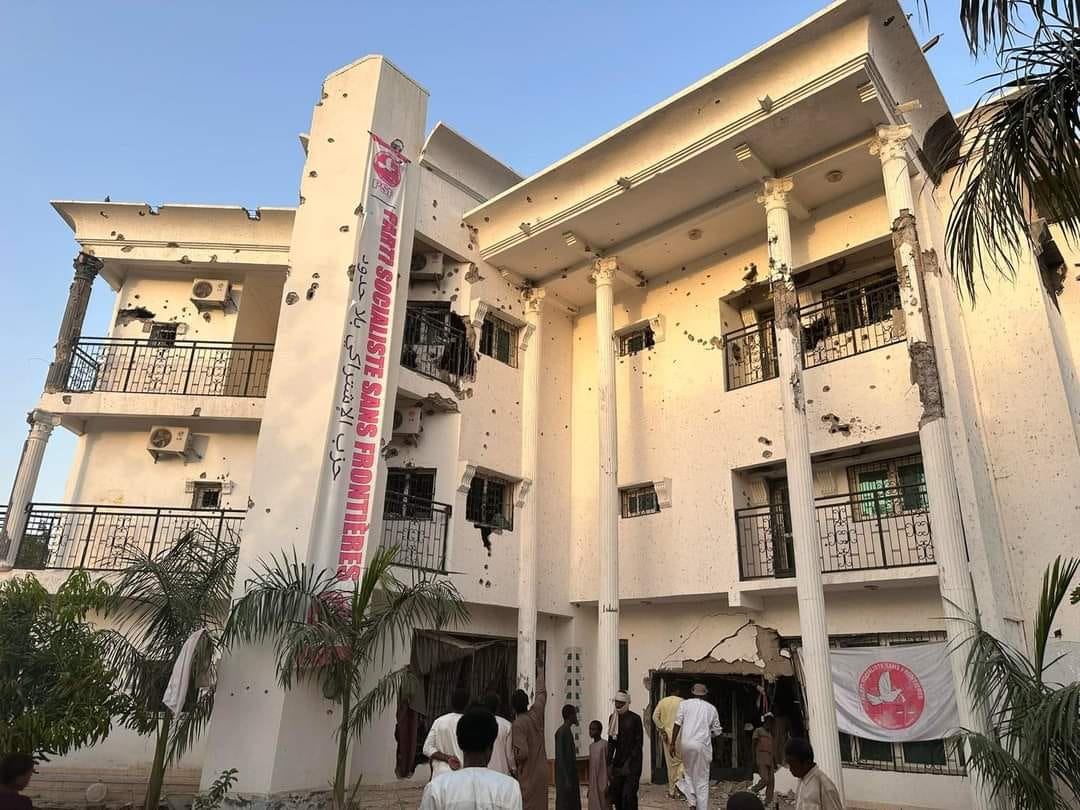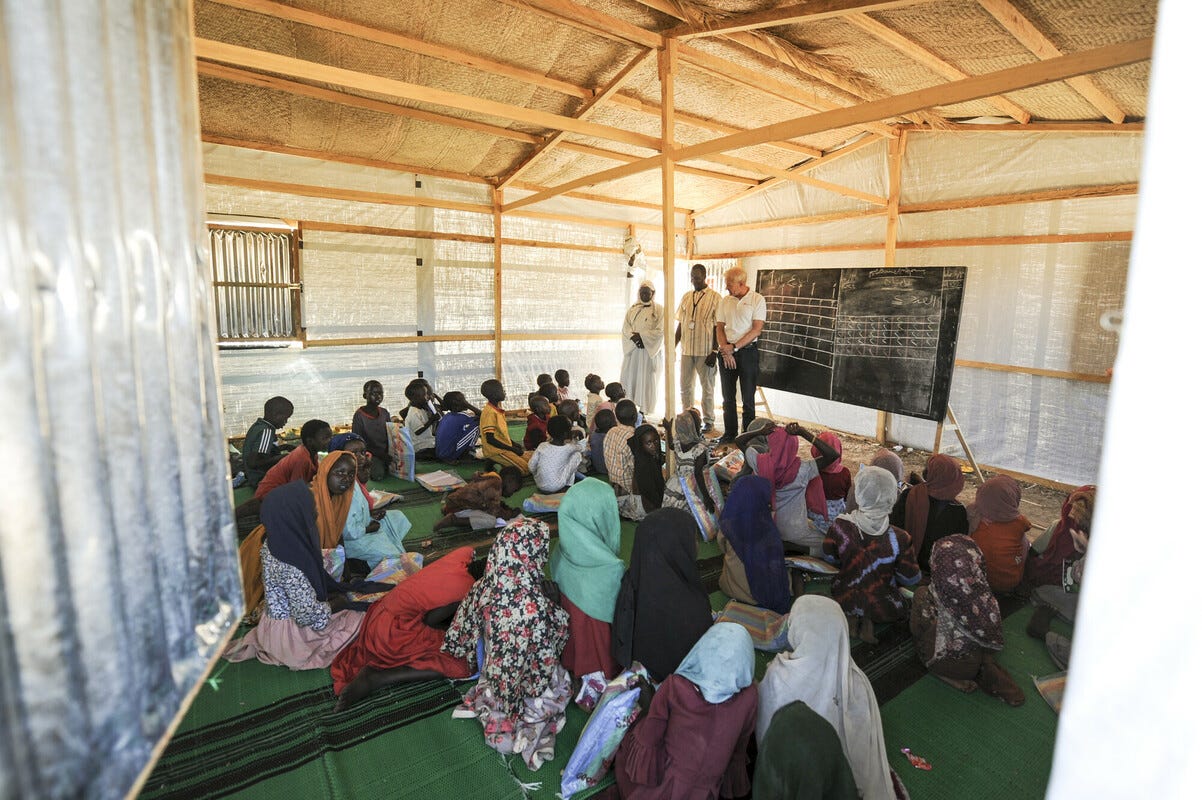Chad instability threatens Darfur refugees
Gunfight at opposition party headquarters N'djamena ahead of elections
Gunfire rocked the Chadian capital N’djamena yesterday amid reports that security forces killed an opposition party official, just days after the announcement of a presidential election on May 6, auguring a turbulent period ahead.
Instability in the central African nation could threaten the wellbeing of vulnerable Sudanese refugees who are living in Chad’s eastern borderlands, after fleeing massacres in Sudan’s western Darfur region last year.
An estimated 550,000 Sudanese have fled into Chad since last year, plus about 140,000 Chadian returnees who had been living in Sudan. They are already suffering hunger, shortages of shelter and water, and a lack of healthcare, owing to the scale and speed of the crisis, and a lack of humanitarian funding.
Yesterday in N’djamena, witnesses heard intense gunfire near the headquarters of the Socialist Party Without Borders (PSF), and saw military vehicles heading there, according to Agence France-Presse.
In a statement, Chad’s Ministry of Communication said that PSF’s finance secretary Ahmed Torabi was arrested after plotting to assassinate the chief justice of the supreme court. After that, PSF members led by the president Yaya Dillo attacked the headquarters of the National Security Agency, resulting in several deaths.
“The situation is now completely under control thanks to the quick and effective intervention of the military and security forces. The plotters of this act were arrested or are known and will be pursued according to the law.“
However, PSF leader Yaya Dillo told AFP news agency the allegation was a lie, saying it was intended to “make me afraid so that I don’t go to the election.”
Dillo is a cousin of Chad’s President Mahamat Idriss Déby. According to some reports, Dillo was killed later yesterday, after speaking with AFP.
Another party official told Reuters that contrary to the government's claim that its members had attacked the National Security building, they had been the ones to come under attack from soldiers while trying to retrieve the body of their colleague Ahmad Torabi. The PSF official said Torabi was arrested and shot dead on Tuesday, before his body was dumped outside the security buildings.
Calm returned to the Chadian capital in the afternoon following the brief clashes, but the eruption of violence signals a period of political repression and fear in the months ahead. According to Tchad Infos, an online newspaper, President Mahamat Idriss Déby held a security meeting and ordered “widespread searches” in N’djamena.
Opposition media Tchad One reports that the political tensions are reverberating within the Armed Forces, writing that security forces yesterday evening surrounded the home of General Saley Déby Itno, who is the uncle of the current president and brother of Chad’s deceased former strongman, who died in battle in 2021.
Saley had joined the opposition PSF just weeks ago, leaving the ruling party.
The Déby family and top members of Chad’s security services belong to the Zaghawa tribe, which is also one of the largest tribes in Darfur, Sudan. If Chad suffers an internal conflict, there is a risk of involvement by the Chadians’ Sudanese kinsmen.
Humanitarian situation in Chad ‘vast challenge’
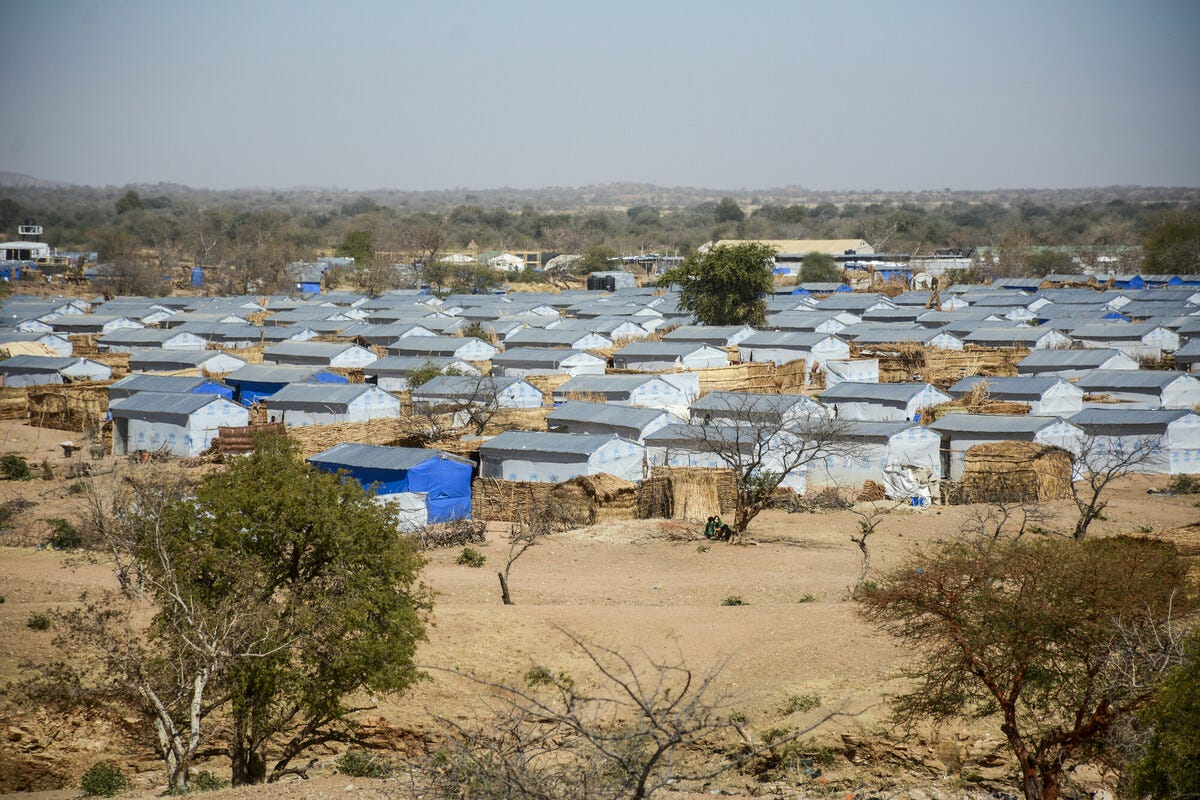
Meanwhile, Sudanese refugees have poured across the Sudan-Chad border in recent months, following a spate of fresh fighting in the Darfur region, which ended in the Rapid Support Forces taking nearly full control of the region.
Most of the refugees are far from the Chadian capital, spread across the provinces of Ouaddaï, Sila, Wadi-Fira and Ennedi East. Nevertheless, instability in the capital could impact humanitarian access, the economy, and security in the longer term, if the political situation doesn’t stabilize.
Norwegian Refugee Council Secretary-General Jan Egeland, who visited eastern Chad earlier this month, wrote on Twitter (X) that the refugees “now face a daily struggle for survival.”
“Chad has received the largest share of people fleeing Sudan. But this influx has placed an unbearable strain on one of the poorest countries in the world. Many survivors here have been forced to improvise totally inadequate shelters, and lack even enough to eat or drink.”
“NRC is operational in Chad: our staff bring life-saving assistance & hope to the hundreds of thousands of Sudanese refugees. But the scale of challenges facing refugees in Chad is vast. Without international attention this is the setting for further humanitarian catastrophe… Immediate and increased assistance for Chad and the broader Sudan crisis is required, alongside political courage from world leaders to end this senseless violence.”
The World Health Organization reported 157 deaths of malnourished children in eastern Chad in a situation report February 28, as well as 33 maternal deaths.
During his visit, Egeland met with survivors and visited a school supported by his organization. Egeland is pictured below, right, next to Jafar, 35, an English teacher who fled from El Geneina, West Darfur. “We walked some seven hours to reach Chad,” Jafar said. “My father, mother and brother were killed.”
“My daughter didn’t manage to escape and is still there. The few of us left there are paying Arabs for protection as they are facing tremendous persecution. We cannot go back. Every family in Geneina has seen killing, executions, all sorts of things.”
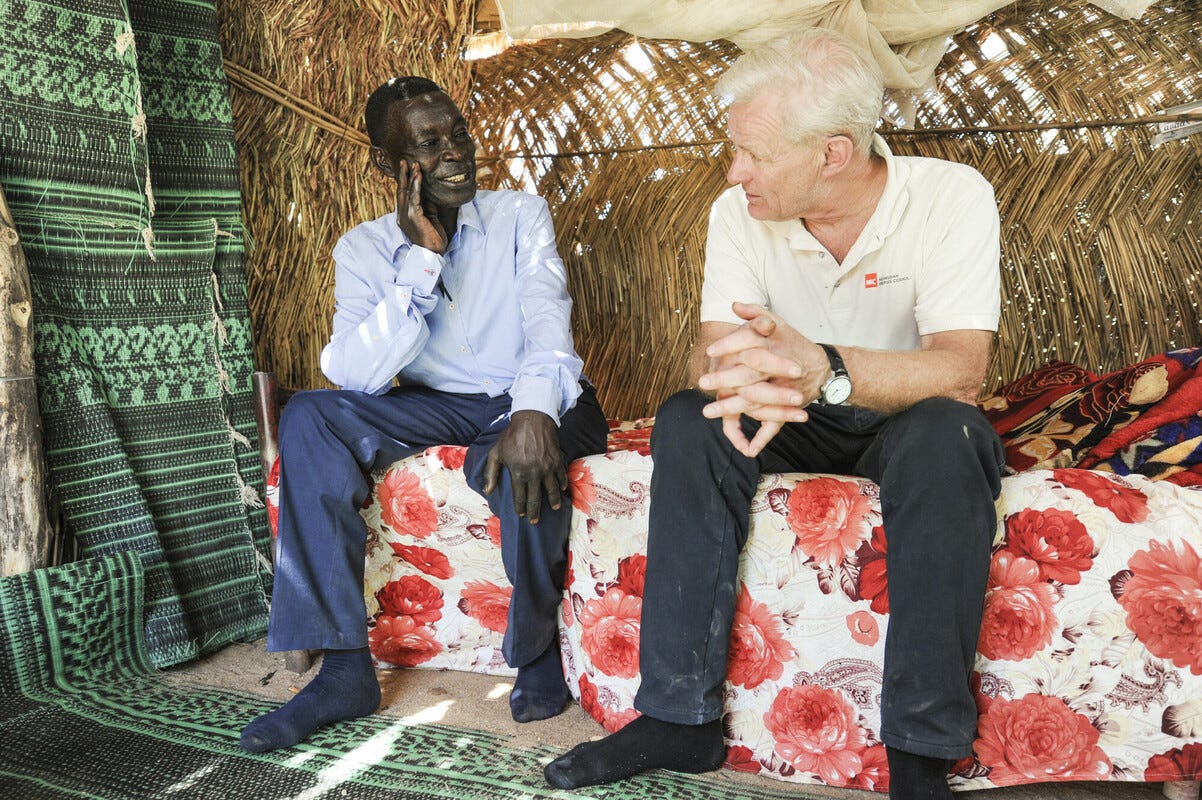
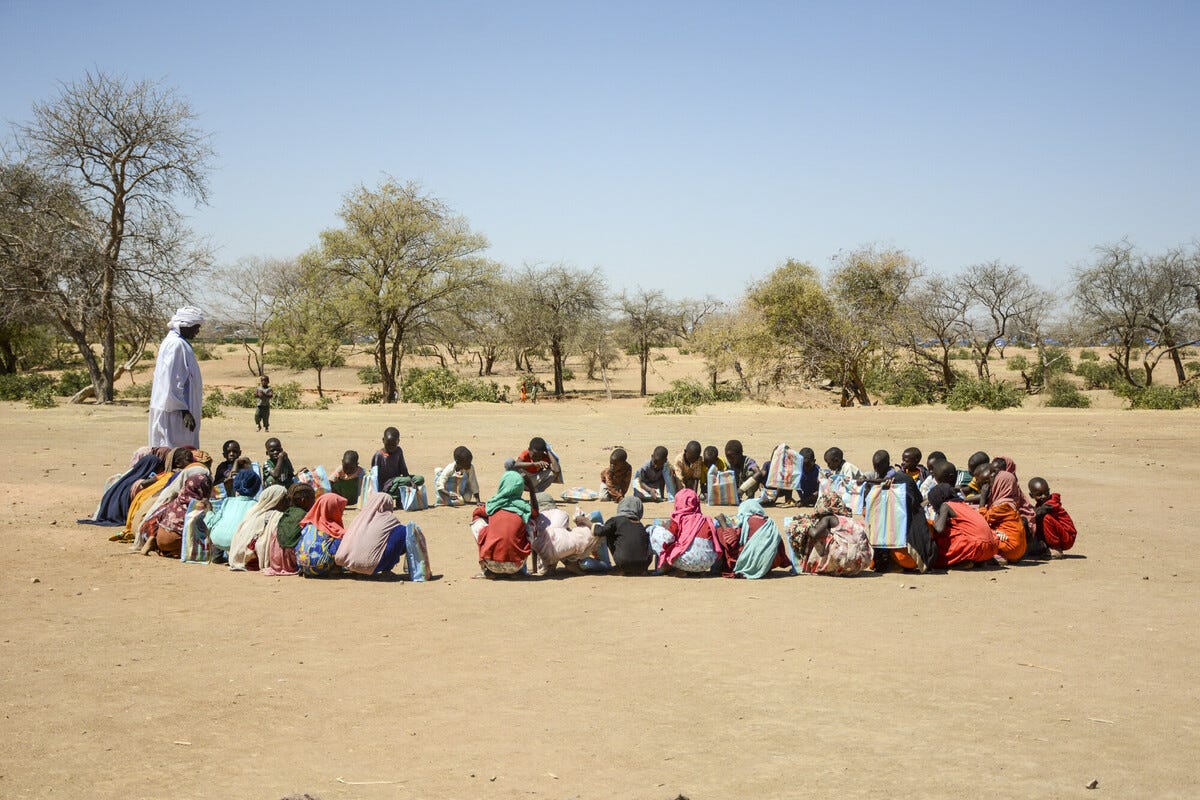
South Sudan threatened by Sudan oil cutoff
Another major risk of instability in the region is emerging in South Sudan, which uses Sudan’s pipelines to export its oil to the Red Sea coast. Although the war in Sudan hasn’t yet cut off the flow of that oil, there have been disruptions, and the risk of a full cut-off is deterring companies from investing and maintaining wells in South Sudan.
Moreover, the Houthi attacks on shipping in the Red Sea are making it more difficult and more expensive to export the oil, and floods have damaged some wells.
“Without immediate intervention, this situation could spell the end for the South Sudanese government,” South Sudan’s Minister of Information said at a press conference Tuesday. “Oil revenue is our primary source of income…”
Such a scenario was discussed in an analysis article in this publication in October 2023, which warned that an oil cutoff “could trigger another civil war and another humanitarian catastrophe” in Sudan’s southern neighbor, adding, “South Sudan’s kleptocratic government survives through a mix of corrupt patronage politics and repressive tactics like controlling the press and arresting political opponents. Without oil revenue, South Sudan’s warlords will turn on each other and fight.”
In brief
The International Rescue Committee said that its logistics partner suspended shipping relief supplies to Port Sudan, due to Houthi attacks in the Red Sea. The decision will raise the aid agency’s transportation costs by more than 40%.
A shipment of much-needed therapeutic food to treat malnutrition has reached South Darfur, according to the state ministry of health.
Displaced people in Shangil Tobaya, North Darfur, have resorted to eating leaves due to a lack of food in the area, a resident told Radio Dabanga.
The Rapid Support Forces claim to have shot down a drone in Omdurman, which was part of an arsenal of drones that SAF use to drop mortar shells. They released this video of the captured equipment.
On February 27, SAF destroyed several RSF combat vehicles, as well as a fuel tanker, in the Kadroo area of northern Bahri, near the Jaili-Khartoum road, which the RSF use to move fuel from the Jaili refinery southward. In recent weeks, SAF patrols out of the Kadroo military area have been ranging farther west, threatening that road. SAF’s Kadroo enclave, though isolated, is supported by artillery and drones based on the opposite bank of the Nile in Omdurman.


